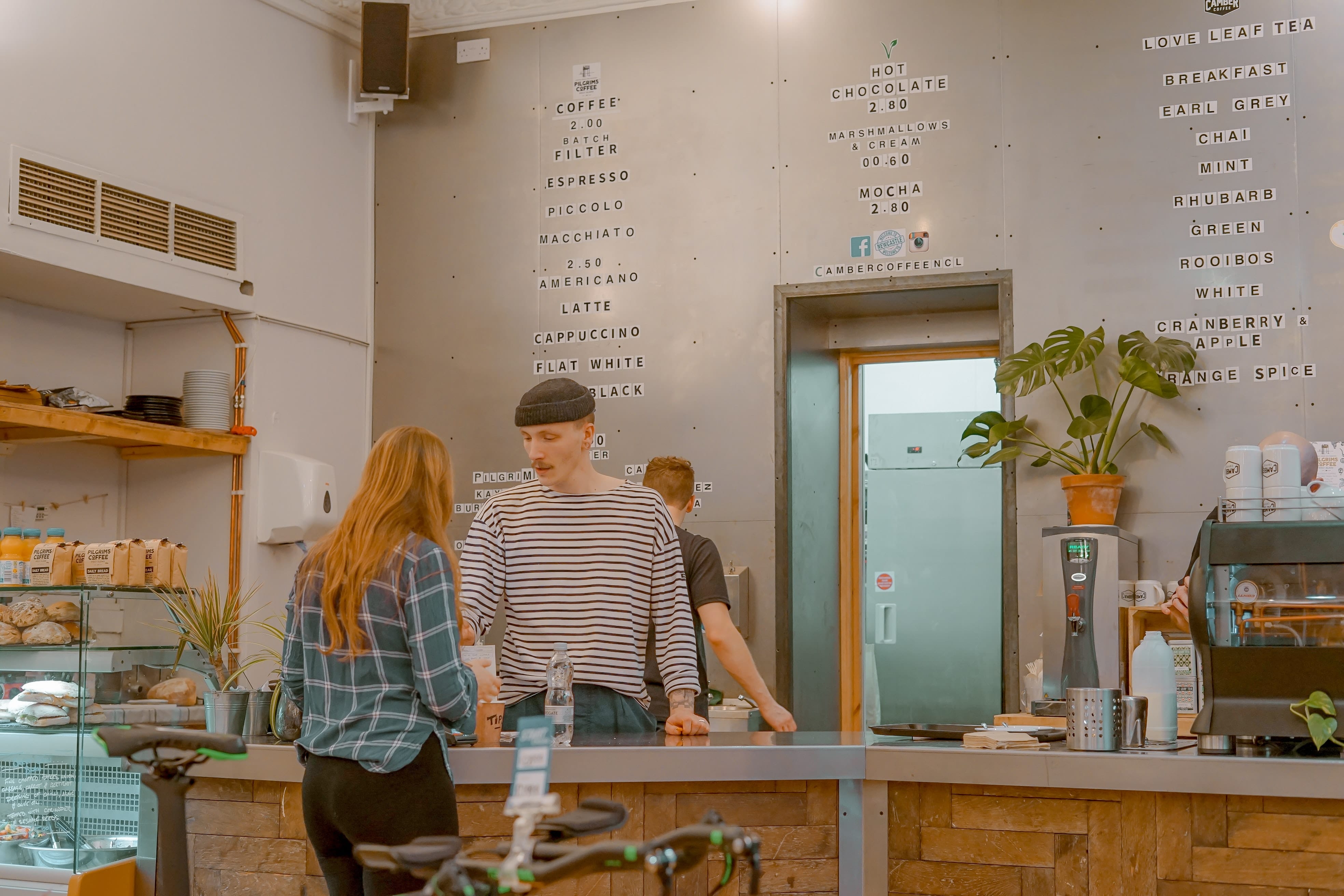Everyone loves a great coffee shop. You don’t even need to actually like coffee to enjoy the ambience of a coffee shop as a place to sit and read or watch the world go by while getting a drink and a bite to eat. Although big brands dominate the coffee shop market, independent and sustainable coffee shops have become increasingly popular.
So, if you’re thinking about setting up your own shop, you might want to consider:
Location & pricing
Location is critical because you need people to be drawn in as they walk past, tempted by the promise of a relaxing break from the rest of their day. You’ll need to consider the amount of people that are likely to walk past your chosen local, known as footfall. Your location might also govern your opening times and the days of the week you choose to be open. For example, if you’re only surrounded by offices far from residential areas you may have low weekend footfall so it may be better to only open on weekdays.
Pricing
Even if you’re in a prime location, punters will only be tempted if the price is right for the product they’re buying. Deciding your pricing strategy is a tall task, you need to be competitive with the giants in the market but also consider if your USP allows you to justify charging more.
USP
You also need to work out what will make your coffee shop stand out from the rest, and what your unique selling point (USP) is, which can be hard in a market of largely very similar offers. This means doing some market research before writing up your business plan. Consider if you’re going to solely use sustainable beans, partner with a cause, a charity or offer additional services like music events or sell books. You don’t necessarily need to find a completely unique USP, it just needs to be novel or unique to that area.
Once you’ve settled on your plan, found the finances to make it happen and picked your ideal location, there’s still plenty to do. So here’s our guide to the essential coffee shop supplies and equipment you need before the big opening day.
Coffee Shop Equipment
If you’ve never run a coffee shop before, you might not know exactly what kind of coffee shop equipment is needed. We’ve put together this starter guide so you can get familiar with the list of coffee shop equipment essentials:
Coffee grinder and brewer
Ok, this is an obvious one. Unless your USP is a coffee shop built on instant coffee and a kettle, you need the right equipment to make a great cup of joe. A bean grinder, a device that grinds whole coffee beans down to a finer grain that can then be used for brewing, is an essential thing to add to your list of coffee shop equipment a UK coffee shop needs to have. You’ll need to decide if you want a blade grinder or a burr grinder. The latter is generally favoured for giving more control for the baristas in the grinding process, which can lead to better flavours.
And then you need a coffee brewer, the device that actually brews the coffee. Again, there are decisions to make, like whether you go with an automatic or manual brewer. The former will get things done more quickly, but doing it manually can create both a more theatrical experience and a more bespoke cup of coffee to attract serious coffee aficionados. There are so many options for how to brew coffee, so if you’re looking for something really different, have a look into Moka pots, french presses and vacuum brewers just to name a few.
It’s also worth looking into a separate milk frother if your coffee brewery doesn’t have one attached.
An oven, grill and/or toaster
It’s not just coffee you’ll be serving unless you really want to focus on the pure experience of the drink. So if you want to be serving any hot food you’ll need an oven, grill and a toaster. People expect cakes and snacks from their coffee shops, you don’t need to worry about how to cook a Sunday roast, but toasties, toasted teacakes, sandwiches and cakes can be served up daily to add to the experience.
Coffee cups
This one’s also a no-brainer. Your customers can’t drink coffee out of their hands, so you need cups and mugs for them to use. Ideally you’ll use branded versions so that when customers share photos on social media, people can see where they are and be tempted to come and visit for themselves. You also need to consider how they look, will they be ceramic, glass, simple, or dramatic? Do you need takeaway cups for customers who are on the go? Finally, you should aim to get these from a wholesaler to get a good saving from buying in bulk. It’s also worth considering recycled or compostable options for take-aways.
Condiments and other essentials
When you go into a coffee shop and make a purchase, the countertop is full of options for you to customise your drink, so your coffee shop will need all of these to meet your own customers’ expectations. Milk, sugar, nutmeg, cinnamon, coffee stirrers, lids for the takeaway cups, sleeves to help them hold their takeaway cups without burning their fingers, napkins… All of these need thinking about, especially if they all need to be branded.
Refrigeration and storage
Refrigeration is a key aspect to consider, especially if you plan to sell soft drinks, fresh pastries and cakes. If the unit you have rented or purchased doesn’t come with a commercial fridge, consider investing in one. It could not only help you to increase your product offering but also boost sales. A glass front fridge or display fridge is ideal, keeping your products fresh and offering a place to store and display your goods and increases the odds of impulse buying.
CCTV and security
Of course, you’ll want to protect your new business from theft and vandalism so a CCTV security system or an alarm is essential. With so many security systems out there, the right one for you will depend on your individual requirements and budget.
A display board
One of the most important factors when generating sales is letting your customers know which products you offer and any potential discounts and deals that may help to get more customers through your doors. For this, you will need a display board to ensure maximum visibility. Of course, you will have social media to promote your best-selling coffee concoctions but a display board will help you capitalise on walk-ins and ensure you don’t miss out on a sale from customers who happen to be passing by.
Coffee shop POS
As well as the basics of making and serving coffee, you also need to consider the point-of-sale (POS) so that you can take payments. In the olden days, this was a traditional till. Now, it’s likely to be a much more sophisticated EPOS system that is easier to use, speeding up the process for customers so they can concentrate on looking forward to receiving their coffee.
When selecting your EPOS provider, think about your specific needs. Are you looking for the flexibility of a tablet till or something like a touchscreen register that will be more hard-wearing? Are you only taking orders in person or accepting online pre-orders? What else do you need it to integrate with to keep your business running smoothly with a minimum of fuss?
Coffee shop taking payments
One thing you will need in your coffee shop is a card machine, an essential piece of coffee shop equipment in the UK today. People expect to be able to quickly and easily pay by card and contactless for on-the-go purchases like coffee. The Dojo Go offers you the flexibility to move around your coffee shop taking payments, all the while connecting to your EPOS and merchant account, helping you serve customers faster and protecting your profits.
Having this integrated system in place also saves you plenty of time because it automatically pushes the payment information to the EPOS, meaning you don’t need to spend the end of each day tallying up the totals and cashing up. This frees you up to stay focused on what really matters about your coffee shop, which is the coffee and helping to make it a great place for coffee lovers to visit.
So, there you have it, a complete rundown of the essential supplies you will need to make your coffee company a success from day one.
Are you ready to maximise your coffee shop sales? Find out more about how Dojo can make taking customer payments a breeze.


